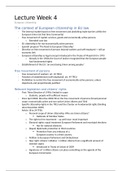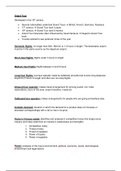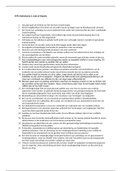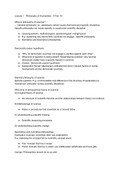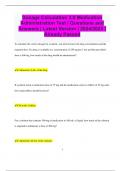Lecture Week 4
European citi zenship
The context of European citizenship in EU law
- The internal market based on free movement and abolishing trade barriers within the
European Union (at that time Community)
- Free movement of capital, services, goods and economically active persons
o Extended case law
- EU citizenship is for not-economically active persons
- Spanish proposal ‘The Road to European Citizenship’
- Directive on free movement of persons beyond workers and self-employed -> still an
economic link
- European citizenship as legal concept introduced in the Treaty of Maastricht in 1993
o Already in the 1960s the Court of Justice recognized that the European people
had fundamental rights
- Establishment of the EU: ‘an everclosing Union among peoples’
Free movement of persons
- Free movement of workers: art. 45 TFEU
- Freedom of establishment (self-employed): art. 49 TFEU
- Prohibition to restrict the free movement of economically active persons, unless
objectively and proportionally justified
Relevant legislation and citizens’ rights
- First: Three Directive of 1990s: limited in scope
o Students, people with sufficient means
- Since April 2006: Directive 2004/38 on the free movement of persons (broad personal
scope: economically active and non-active Union citizens and TCN)
- Specific citizenship rights in the TFEU and the Charter on Fundamental rights (binding
since December 2009)
- Article 18 to 24 TFEU
o Personal scope of Union citizenship: Who are Union citizens?
Nationals of Member States
o The right to free movement – up until now: most important
o Electoral rights: equal treatment European Parliament and municipal elections
Not for national elections
o (Equal) diplomatic protection in third countries
Protection from any embassy of a
European country in a third country
o Petition to European Parliament and Ombudsman
o New right: citizens’ initiative: 1 million citizens from a significant amount of
member states
Introduced in Treaty of Lisbon of 2009
o Signatures of 1 million citizens can place something on the agenda of the
European Commission
, However, the European Commission can still decide to not deal with
the initiative
o Is under reform now, because it received a lot of criticism
Nationality as the gateway to European citizenship
- Access to European citizenship
o Dependent on national law: Chen case
Miss Chen was a Chinese woman, while pregnant of her second child.
She travelled to Northern Ireland, where she got her baby. She went
back to China. The baby got the Northern Irish nationality, because of
a law of that time. She went back to Northern Ireland with her baby
and then said; I live in Wales with a EU citizen, so I have the right to
stay. She got the right to reside in the UK based on this. Several
governments argued that this was misuse of EU law, but the Court of
Justice did not agree with this. The law of Northern Ireland had been
quickly repealed after this case.
o Case Rottmann: withdrawal of nationality
Mr. Rottmann was an Austrian national who went to Germany. He was
subject to criminal proceedings in Austria. He got the German
nationality by naturalization procedure. The authorities found out that
he lied during that procedure because he was subject to two criminal
proceedings. His German nationality was withdrawn. Based on
Austrian law, he would also lose his Austrian nationality, because you
cannot have two nationalities based on Austrian law. He would then
end up without nationality. He claimed that he was a EU citizen and
member states cannot simply withdraw a nationality. It was a rather
internal situation, because he was a German living in Germany. The
Court of Justice said that because of the nature and consequences it
falls under the scope of EU law, so the member states have to make
sure that the withdrawal of nationality is proportional. In the end he
lost his German nationality (in the following German case)
o Brexit
Two ways for European citizenship right
- Art. 21 TFEU and Directive 2004/38: Free movement
- Art. 20 TFEU: static European citizens (very limited)
Directive 2004/38
- Right to move and reside freely:
o “This Directive shall apply to all Union citizens who move to or reside in a
Member State other than that of which they are a national, and to their family
members.”
- Residency rights:
o 3 months – valid ID
o 5 months – 5 years: sufficient means, healthcare insurance
o 5 years: permanent residency
- Expulsion measures: public policy, public health or public security
European citi zenship
The context of European citizenship in EU law
- The internal market based on free movement and abolishing trade barriers within the
European Union (at that time Community)
- Free movement of capital, services, goods and economically active persons
o Extended case law
- EU citizenship is for not-economically active persons
- Spanish proposal ‘The Road to European Citizenship’
- Directive on free movement of persons beyond workers and self-employed -> still an
economic link
- European citizenship as legal concept introduced in the Treaty of Maastricht in 1993
o Already in the 1960s the Court of Justice recognized that the European people
had fundamental rights
- Establishment of the EU: ‘an everclosing Union among peoples’
Free movement of persons
- Free movement of workers: art. 45 TFEU
- Freedom of establishment (self-employed): art. 49 TFEU
- Prohibition to restrict the free movement of economically active persons, unless
objectively and proportionally justified
Relevant legislation and citizens’ rights
- First: Three Directive of 1990s: limited in scope
o Students, people with sufficient means
- Since April 2006: Directive 2004/38 on the free movement of persons (broad personal
scope: economically active and non-active Union citizens and TCN)
- Specific citizenship rights in the TFEU and the Charter on Fundamental rights (binding
since December 2009)
- Article 18 to 24 TFEU
o Personal scope of Union citizenship: Who are Union citizens?
Nationals of Member States
o The right to free movement – up until now: most important
o Electoral rights: equal treatment European Parliament and municipal elections
Not for national elections
o (Equal) diplomatic protection in third countries
Protection from any embassy of a
European country in a third country
o Petition to European Parliament and Ombudsman
o New right: citizens’ initiative: 1 million citizens from a significant amount of
member states
Introduced in Treaty of Lisbon of 2009
o Signatures of 1 million citizens can place something on the agenda of the
European Commission
, However, the European Commission can still decide to not deal with
the initiative
o Is under reform now, because it received a lot of criticism
Nationality as the gateway to European citizenship
- Access to European citizenship
o Dependent on national law: Chen case
Miss Chen was a Chinese woman, while pregnant of her second child.
She travelled to Northern Ireland, where she got her baby. She went
back to China. The baby got the Northern Irish nationality, because of
a law of that time. She went back to Northern Ireland with her baby
and then said; I live in Wales with a EU citizen, so I have the right to
stay. She got the right to reside in the UK based on this. Several
governments argued that this was misuse of EU law, but the Court of
Justice did not agree with this. The law of Northern Ireland had been
quickly repealed after this case.
o Case Rottmann: withdrawal of nationality
Mr. Rottmann was an Austrian national who went to Germany. He was
subject to criminal proceedings in Austria. He got the German
nationality by naturalization procedure. The authorities found out that
he lied during that procedure because he was subject to two criminal
proceedings. His German nationality was withdrawn. Based on
Austrian law, he would also lose his Austrian nationality, because you
cannot have two nationalities based on Austrian law. He would then
end up without nationality. He claimed that he was a EU citizen and
member states cannot simply withdraw a nationality. It was a rather
internal situation, because he was a German living in Germany. The
Court of Justice said that because of the nature and consequences it
falls under the scope of EU law, so the member states have to make
sure that the withdrawal of nationality is proportional. In the end he
lost his German nationality (in the following German case)
o Brexit
Two ways for European citizenship right
- Art. 21 TFEU and Directive 2004/38: Free movement
- Art. 20 TFEU: static European citizens (very limited)
Directive 2004/38
- Right to move and reside freely:
o “This Directive shall apply to all Union citizens who move to or reside in a
Member State other than that of which they are a national, and to their family
members.”
- Residency rights:
o 3 months – valid ID
o 5 months – 5 years: sufficient means, healthcare insurance
o 5 years: permanent residency
- Expulsion measures: public policy, public health or public security


